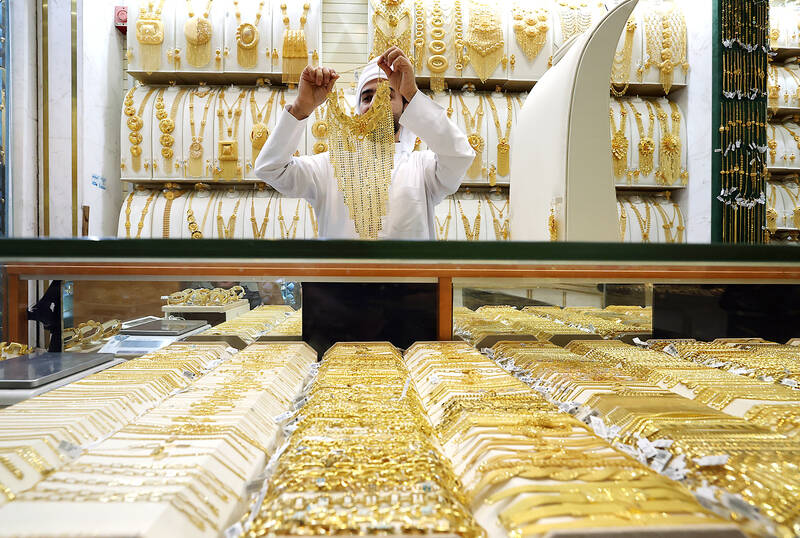The Bank of Taiwan (臺灣銀行) yesterday said that its gold price reached a record-high NT$3,518 (US$108.14) per gram at noon as the trade war between the US and China raged on.
The state-run bank said its intraday gold passbook price has increased 25.6 percent since the start of the year, when the price stood at NT$2,801 per gram.
The sharp rise in the price was driven by an influx of capital into gold markets amid escalating tariffs between the US and China, the bank said in its international gold market report.

Photo: EPA-EFE
A sharp decline in the US Dollar Index has also triggered capital flows into gold markets, pushing prices higher, the bank said.
Gold’s appeal has further increased, as the precious metal is less affected by tariffs, the bank said, citing analyses by asset management firms.
Bullion yesterday rose as much as 0.4 percent to US$3,357.78 an ounce in Singapore, before paring gains. The metal added 3.5 percent on Wednesday in its biggest one-day gain since March 2023, as the US dollar fell to a fresh six-month low. The precious metal has climbed almost 28 percent this year, outpacing the 27 percent gain it notched last year.
“The big theme is uncertainty,” which is benefiting gold, ABC Refinery (Australia) Pty Ltd global head of institutional markets Nicholas Frappell said. “Uncertainty about the scale and breadth of tariffs, uncertainty over the strategic plan of the US administration and the degree to which America’s trade partners will respond.”
The UBS Wealth Management Chief Investment Office in a report this week said it has raised its 12-month price target for gold to US$3,500 per ounce, citing concerns over tariffs, inflation, geopolitical risks and shifting interest rate expectations.
UBS said demand for gold was also being driven by structural changes in allocation, including a February decision by Chinese regulators allowing insurance funds to invest in gold, and systematic reserve increases by central banks in various countries.
Additional reporting by Bloomberg

The DBS Foundation yesterday announced the launch of two flagship programs, “Silver Motion” and “Happier Caregiver, Healthier Seniors,” in partnership with CCILU Ltd, Hondao Senior Citizens’ Welfare Foundation and the Garden of Hope Foundation to help Taiwan face the challenges of a rapidly aging population. The foundation said it would invest S$4.91 million (US$3.8 million) over three years to foster inclusion and resilience in an aging society. “Aging may bring challenges, but it also brings opportunities. With many Asian markets rapidly becoming super-aged, the DBS Foundation is working with a regional ecosystem of like-minded partners across the private, public and people sectors

Taiwan Semiconductor Manufacturing Co (TSMC, 台積電) has secured three construction permits for its plan to build a state-of-the-art A14 wafer fab in Taichung, and is likely to start construction soon, the Central Taiwan Science Park Bureau said yesterday. Speaking with CNA, Wang Chun-chieh (王俊傑), deputy director general of the science park bureau, said the world’s largest contract chipmaker has received three construction permits — one to build a fab to roll out sophisticated chips, another to build a central utility plant to provide water and electricity for the facility and the other to build three office buildings. With the three permits, TSMC

BREAKTHROUGH TECH: Powertech expects its fan-out PLP system to become mainstream, saying it can offer three-times greater production throughput Chip packaging service provider Powertech Technology Inc (力成科技) plans to more than double its capital expenditures next year to more than NT$40 billion (US$1.31 billion) as demand for its new panel-level packaging (PLP) technology, primarily used in chips for artificial intelligence (AI) applications, has greatly exceeded what it can supply. A significant portion of the budget, about US$1 billion, would be earmarked for fan-out PLP technology, Powertech told investors yesterday. Its heavy investment in fan-out PLP technology over the past 10 years is expected to bear fruit in 2027 after the technology enters volume production, it said, adding that the tech would

YEAR-END BOOST: The holiday shopping season in the US and Europe, combined with rising demand for AI applications, is expected to drive exports to a new high, the NDC said Taiwan’s business climate monitor improved last month, transitioning from steady growth for the first time in five months, as robust global demand for artificial intelligence (AI) products and new iPhone shipments boosted exports and corporate sales, the National Development Council (NDC) said yesterday. The council uses a five-color system to measure the nation’s economic state, with “green” indicating steady growth, “red” suggesting a boom and “blue” reflecting a recession. “Yellow-red” and “yellow-blue” suggest a transition to a stronger or weaker condition. The total score of the monitor’s composite index rose to 35 points from a revised 31 in August, ending a four-month